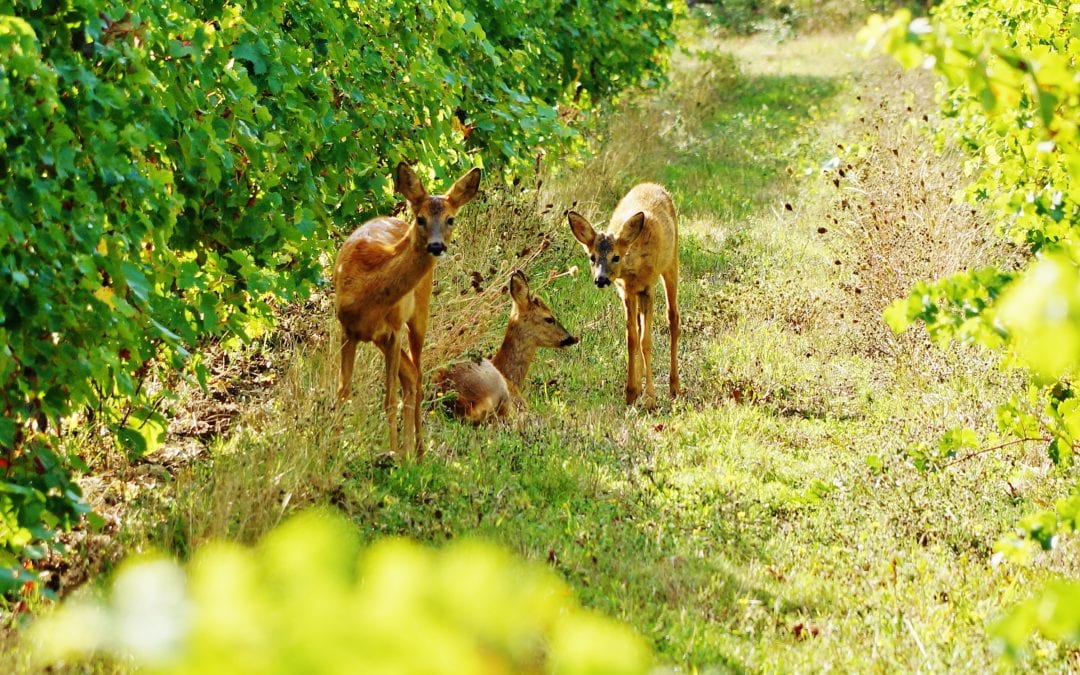Organic wine is made using only organically certified grapes, grown without synthetic pesticides, herbicides, fungicides and chemical fertilisers. So, in essence, fewer chemicals go into the soil and ultimately into you!
In 2012 the EU introduced the first legislation to legally control the use of the term “organic wine” and to set standards so that the consumer knows what has (or rather has not) been used in the production of organic wines. This means that the whole process is certified from harvest to bottle and the term ‘Organic Wine’ can be displayed on bottles. (show green leaf label – pic in dropbox).
Of course the benefits are numerous! For a start, taste – organic grapes are healthy and balanced and are of course the raw ingredient for any great wine. Then the health benefits include ingesting less man made toxins, especially pesticide residues and less sulphur dioxide too which is the ‘wine preservative’ which gives you a hangover. By drinking ‘organic’ you are helping to support a cleaner environment and protect soils and water. Have a look at this video form the Cuisset family showing some of the organic techniques used in their vineyard.
We think that this natural process contributes significantly to the flavour of the wines, with smoother finishes and less after taste. The benefit of no hangover is also rather marvelous (but not guaranteed if you really go for it!!)
And we are not alone. The growth of organic wine is outstripping the growth of the overall still wine market, showing that it is increasingly popular with consumers.
In 2019 an IWSR report into the growth of organic wines predicted that while overall total wine consumption in the UK is in decline, organic wine volume is expected to grow by 9.4% annually between 2017 and 2022. About 72% of organic wine in the UK is from the Old World, with France, Italy and Spain at the forefront. Organic wine speaks to a broad audience in the country, especially wine lovers and/or regular buyers of organic produce and those who reside in metropolitan areas.
Ok, so organic farming + organic winemaking = organic wine. But why should we care and why are more and more people drinking organic wines? The lack of manipulation in both the field and cellar leads to a wine that is arguably more real, and definitely more natural. Organic wine is most often the best expression of both the grape and also the terroir, the land and environment in which it is grown.
Additionally, the saying goes, you are what you eat (and drink). So there’s definitely a peace of mind that comes with knowing that no pesticides or additives are going into your wine. But what does that really mean? Are organic wines healthier? The short answer is yes. In general, organic wine grapes are much healthier and therefore produce heartier skins and higher concentrations of all of those good for you anthocyanins and antioxidants, including polyphenols and cardio-friendly resveratrol. Also, organic wines are free of residual traces of vineyard additives such as chemical laced pesticides and herbicides.
Certified organic wines also have less sugar on average and don’t contain potentially harmful cellar additives such as flavoring agents or caramel coloring. These additives plus higher sugar levels are what typically lead to headaches. So going organic may help prevent that future headache.
There are also real, tangible and lasting benefits to the environment and the farmers as a result of transitioning to organic farming practices. Specifically, organic vines tend to need less water applied, because soils are built up with compost and contain more organic matter, which holds water far better. Organic vines have been proven more resilient against increasing droughts and temperature spikes.
By curtailing harmful and unnecessary irrigation practices organic wineries are protecting local ecosystems and preserving their surrounding flora and fauna. By using less water and not tainting the existing water supply with chemicals, the vineyard workers are doing their part to leave the earth as healthy, if not healthier, than they found it.
Speaking of vineyard workers, EU Organic certifications have guidelines in place to ensure ethical treatment of employees from those picking the grapes to those stomping on the grapes. By drinking organic wines, you’re supporting independent families and their staff.

